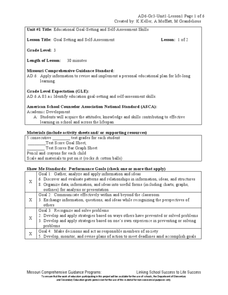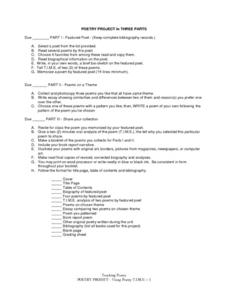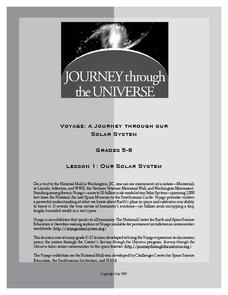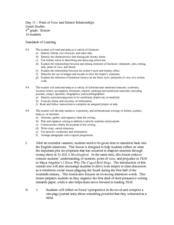Curated OER
Using the Scientific Method to Determine Which Conditions Best Favor Plant Growth
Seventh graders examine how the environment can affect biological processes. They identify the best conditions for the germination of bean seeds. They record and analyze their data. They write about their observations in an essay.
Museum of Tolerance
Artifact Research Activity
Artifacts give us the privilege of learning about the past, may it be family, culture, or traditions. Here, class members learn about their family's past with the help of an artifact, or family heirloom. Once an artifact is discovered,...
Curated OER
Goal Setting and Self-Assessment
Third graders review the importance of good study habits as a skill necessary for success in school. They focus on their goals and discuss how this would help to improve grades. They determine how much an F weighs their grade down.
Curated OER
Reflection on Educational Goal Setting and Self-Assessment
Third graders evaluate their performance at school. They examine their most recent spelling test scores to determine whether or not they met their goals for the test.
Curated OER
Coping or Coping Out?
Fifth graders explore, analyze and study personal safety skills and coping strategies for managing life changes or events. They participate in small groups to identify and present coping skills when experiencing possibly the loss of a...
Curated OER
"Remembering My Childhood on the Continent of Africa" by David Sedaris
David Sedaris is quite the story-teller. Read "Remembering My Childhood on the Continent of Africa" and follow it up with this two-page worksheet. Readers will revisit the text to answer higher level thinking questions. Designed...
Curated OER
Cheerful Hearts and Willing Feet
Students explore characterization in Little Women. In this literature lesson, students participate in written analysis and research in order to explore Alcott's characterization in the novel.
Annenberg Foundation
Gothic Undercurrents
Terror, mystery, excitement. American writers of the 19th century, including Nathaniel Hawthorne, Herman Melville, and Emily Dickinson, used these elements to create morally ambiguous tales that challenged the prevailing belief in...
Curated OER
US Constitution And Federal/State Relationship
Learners examine the Constitution for references to the relationship between state and federal governments. They examine Supreme Court cases for examples of the division of government between state and federal powers.
Curated OER
World Literature From Africa
Students prepare for and respond to literature selections. This package includes twenty-four lessons from the World Literature series, each covering a different reading selection from Africa. Pre-reading and response activities are...
Curated OER
Travels With Charley
Fifth graders engage in a literature study that uses a variety of texts in order to maximize their exposure to different reading situations. They examine each book in order to practice skills of reading comprehension. They recognize the...
Teaching English
Poetry Project in Three Parts
It’s poetry T.I.M.E! Individuals use the T.I.M.E. format (T = Title, thought, and theme; I = Imagery and figurative language; M = music and sound; E = emotion) to study a poet, collect poems that have a similar theme, and create a...
Curated OER
1930 Census and the Consitution
Students read the Constitution and discuss the importance of enumeration. In this Census instructional activity, students complete a Census schedule and discuss the job skills of applicants. Students research Census data to compare and...
Curated OER
Our Solar System
Students explain the classification of planets according to various criteria. They create charts illustrating comparative data.
Curated OER
Exploring Heroism
Students examine the concept of heroism in this lesson, through personal reflection, group activities and a thoughtful analysis of the documentary, HEROES OF GROUND ZERO. They explore their own understanding of what it means to be a hero.
Curated OER
Cross-Cultural Dialogue Lesson
Students view situations from more than their own point of view. They use the incidents in the author's story to explore the concept of crossing cultures and reflect on what it is like to feel like an outsider (in the way that the author...
Curated OER
Creating a Pot: Repetition as a Unifying Design Element
Students use subjects, themes, and symbols that demonstrate knowledge of contexts, values, and aesthetics that communicate intended meaning in artworks.
Curated OER
Creating a Neighborhood Timeline
Middle schoolers research information about their neighborhoods. Uncovering facts about geology and Native Americans, they examine how the neighborhood has evolved over time. They work together to create a timeline of specific events.
Curated OER
The Student Newspaper on World War I
Students explore WW I through the publication of a completely student-compiled newspaper.
Curated OER
Steps To An Inquiry Process
Fourth graders investigate the research process. The finding of information about the indian tribes of Montana provides the context for student practice. They identify the problem and generate questions to find answers. The main...
Curated OER
Point of View and Mentor Relationships
Tenth graders analyze the role of mentors, point of view, and prejudice using the texts of To Kill a Mockingbird and Maya Angelou's I Know Why the Caged Bird Sings. For this literature analysis lesson, 10th graders review Scout's...
Curated OER
Economic Decisions
Students practice decision-making skills by planning vacation, including all proposed expenses. Students distinguish between needs and wants, identify difference between goods and services, and describe economic resources used in...
Curated OER
Transformations
Students identify the types of transformations in their lives. As a class, they determine the ones they have control over and which ones they do not. They practice solving problems in math and oral communication that they are faced with...
Curated OER
Acting Like a Bunch of Animals: Fables and Human
The video "The Tales of Aesop" traces for viewers the history of fables and identifies their characteristics. The class then goes to the web site "The Fisherman and the Little Fish" where they examine the classic and a modern version of...

























